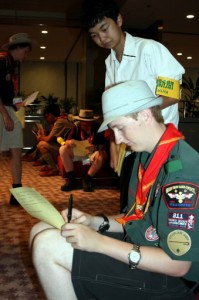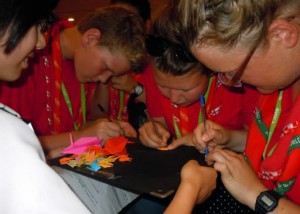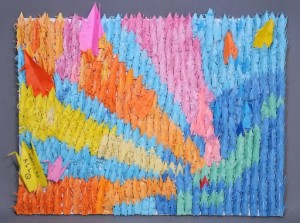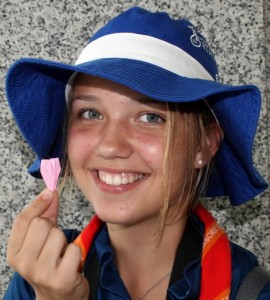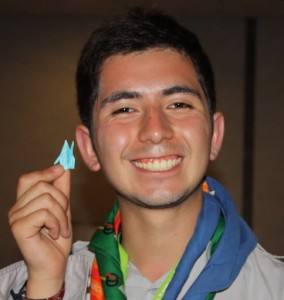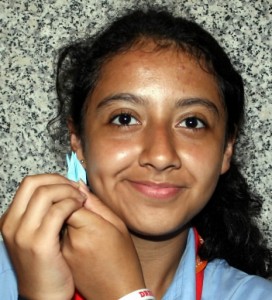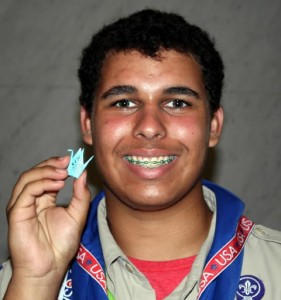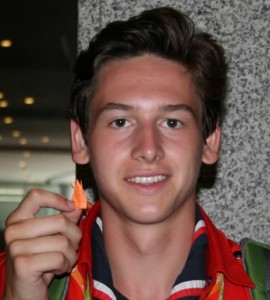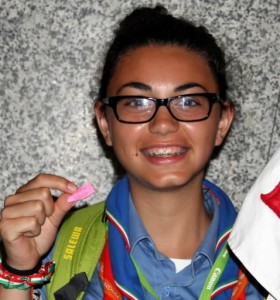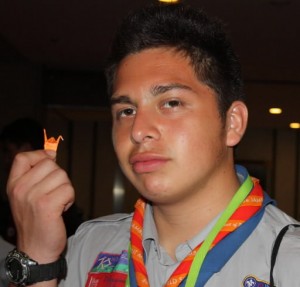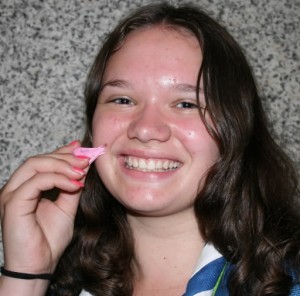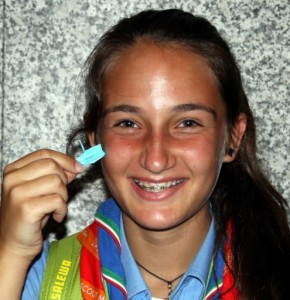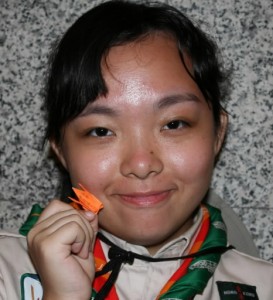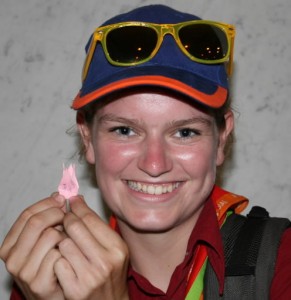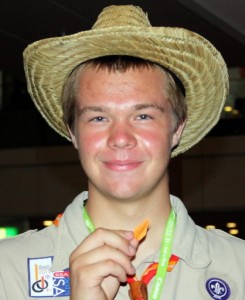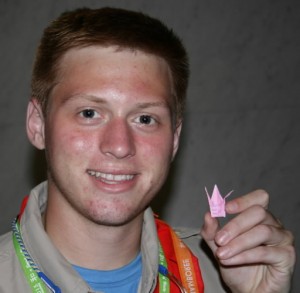Peace Seeds: Teens in Hiroshima Sow Seeds of Peace (Part 15)
Aug. 13, 2015
Part 15: Survey of young people from overseas in Hiroshima
The junior writers carried out a survey of Boys Scouts and Girls Scouts from other nations when they visited Hiroshima for a “peace program” in connection with the 23rd World Scout Jamboree, an international gathering held in the city of Yamaguchi from July 28 to August 8. In all, 1,031 Scouts from 50 countries and regions responded to questions involving the atomic bombing, nuclear weapons, and peace.
While in the Hiroshima Peace Memorial Park, the Scouts toured the Peace Memorial Museum and listened to retellings of A-bomb experiences. The survey sheets, filled in with detailed responses, showed that these young people, regardless of nationality, gender, or age, were shocked by the sight of the photos and personal effects of the A-bomb victims at the museum, which were more horrific than they had imagined, and appalled by nuclear weapons.
We also asked the Scouts to write a message of peace on a folded paper crane, and we took photos of them. In this way, hopeful smiles for a peaceful planet, from around the world, were gathered. Using the paper cranes, with their peace messages, we made a mosaic and offered it to the Children’s Peace Monument, which stands in the Peace Memorial Park.
What were their strongest impressions of Hiroshima?
Many of the respondents said that the exhibits at the Peace Memorial Museum left a powerful impression, including such things as photos of A-bomb victims who suffered burns, stone steps where a human shadow still lingers, the victims’ personal effects, and glass melted by the bomb’s intense heat rays. “It was so awful and emotional, I found it hard to believe,” a 16-year-old girl from the United Kingdom wrote. Some mentioned feeling moved by the story of Sadako Sasaki, a young A-bomb survivor who later died of leukemia while folding paper cranes.
The personal accounts of the atomic bombing also struck many of the respondents. A 17-year-old girl from Germany wrote, “I feel that the personal stories and, in particular, what happened to individuals gave us something we only know from school books. It was a much more emotional touch, and helped me to understand this catastrophe better.”
Other Scouts responded that they came away inspired by the people of Hiroshima, who managed to reconstruct the city from the ruins of the A-bomb attack, and that they now feel a deeper sense of horror over nuclear arms.
Some wrote their opinions about the atomic bombing. A 14-year-old boy from Brazil said, “It’s tragic that human beings would attack other human beings with this weapon, just to test it.” At the same time, different views were also seen. One 15-year-old boy from the United States stressed a positive view of possessing nuclear arms, adding, “Nuclear weapons should only be used in extreme situations.” A 17-year-old boy from Bosnia-Herzegovina responded, “I feel sad after visiting the museum, but I’m also hopeful that we never see anything like this again.” (Shiori Niitani, 16)
How do they perceive the atomic bombings and nuclear weapons?
At the heart of the Scouts’ impressions was the shock they felt over the destructive power of the atomic bomb, which was greater than they had imagined. A 16-year-old boy from the United Kingdom tied the atomic bombing to the Holocaust, the genocide of the Jewish people, by writing, “I’ve also seen the atrocities of the Holocaust and this hit me just as hard.”
A 16-year-old boy from Mexico expressed a change of heart, saying, “I used to believe that the atomic bombings were necessary to put an end to the war. Now I think a peaceful way was possible.” In addition, a 17-year-old girl from Germany responded, “I was already strongly aware of the devastating effects of nuclear weapons because I’ve read about this subject before.”
Some responses seemed to echo the positions of national governments. A 16-year-old boy from Austria, a nation leading the movement to ban nuclear arms, wrote, “Weapons of mass destruction cannot bring peace, they only bring war.” Meanwhile, a 16-year-old boy from the United States provided a very different response, stating, “Nuclear weapons should never be used, but they do serve as a deterrent.”
I would like many more people to visit Hiroshima, see how horrible the atomic bombing was, and think about nuclear weapons, war, and a peaceful world. (Midori Nakagawa, 14)
What do they see as the biggest problems to address in creating a peaceful world?
We asked the respondents to choose three issues from a list of 13. The largest number of young people, 382, chose “terrorism.” This was about 40% of the respondents. In terms of countries or regions with 10 or more respondents, Turkey had the highest percentage of people who chose this issue: 75% or 9 out of 12 respondents. After Turkey was Belgium, with 66.7%, and the Netherlands, with 57.6%. Terrorism has become a concern of young people throughout the world.
The next greatest concern was “racial discrimination,” which was chosen by 334 respondents, amounting to 35.9% of the total. Nine out of 14 people from Portugal chose this issue, followed by 7 out of 11, or 63.6%, of the respondents from Colombia. Young people from Asian nations, however, were less likely to choose this: none of the respondents from Cambodia, and only 11.5% of the respondents from Hong Kong, made this choice.
The third most-chosen issue was “religious conflict,” selected by 278 people, or 29.9% of the total. At the high end, 50% (6 out of 12) of the respondents from Belgium, and 49.2% (31 out of 63) of those from Indonesia, made this choice. Though, to us, religious differences don’t seem to be a major concern in Japan, it is clearly an issue of interest to people in other countries.
“Nuclear weapons” was chosen by 244 people, or 26.2%; “distrust between countries” was chosen by 231 people, or 24.8%; and “poverty” was chosen by 218 people, or 23.4%. (Hiromi Ueoka, 14)
What can they do, in their own lives, to help create a more peaceful world?
Many survey respondents said that they would like to send out messages of peace in their local areas. Because the jamboree was an international event, this came as a small surprise. But we suspect that Scouts have adopted this view as a result of the actions they take in their local communities.
A 16-year-old boy from Swaziland in southern Africa responded, “Spread the word of peace and be friendly to everyone.” A 15-year-old girl from the United Kingdom wrote, “Try to have others see how awful the atomic bombing really was to help create a peaceful world.” Her comment leads us to believe that she learned a lot in Hiroshima. Many of the respondents, regardless of nationality, answered, “Be more kind to others” or “Continue my activities as a Scout.”
The junior writers would also like to convey the importance of peace by covering the experiences of the A-bomb survivors and writing other articles. (Riho Kito, 14)
--------------------
Mosaic made with paper cranes
We asked the Scouts to write a message of peace on paper cranes and we put these cranes together to create a mosaic. We felt nervous speaking to the Scouts in English, but they understood us and graciously accepted this request for a message.
We received messages of peace from many young people in Western, Middle Eastern, and Asian countries, among other areas. On many paper cranes were words like “smile” or “love,” which indicated their wish for a peaceful world. Some messages were written in Thai, Spanish, or Chinese. We then took photos of them smiling as they held their paper crane with the peace message.
With these cranes we made a mosaic, imagining that a peaceful world will spread from Hiroshima to the whole planet. I hope this message of peace can be communicated far and wide, with the wishes of Boy Scouts and Girl Scouts from all over the world. (Ai Mizoue, 13)
Personal impressions from the junior writers
The survey included about 1,000 young people from a variety of countries. This is my sixth year as a junior writer, but it was the first time I was involved in such a big survey. This experience made me think again about how, in order to move toward a peaceful world, it’s important to fully understand the fact that there are are many views on nuclear weapons, discrimination, and environmental destruction among the world’s young people. (Arata Kono)
I helped tally the survey responses. In this way, I came to understand that young people around the world still consider terrorism and racism to be the biggest problems on this earth. I would like to continue my exchange activities with people from other countries so I can broaden my perspective and provide mutual support so we can live together peacefully. (Takeshi Iwata)
I saw many Scouts from a variety of countries gathering at the International Conference Center Hiroshima. It was the first time I met people from certain countries, and other people from countries that I couldn’t recognize when I saw their national flag. But once we spoke, I was able to tell them what I wanted to say. I was really happy that, despite my poor English, I was able to communicate with them. (Harumi Okada)
I haven’t had much experience speaking to people from other countries, and this activity made me realize how poor my English ability is. I felt hesitant to talk to them and had a hard time gathering responses for the survey. The Scouts were very kind to me, though. I was happy because they communicated their thoughts with gestures when I couldn’t understand their English. (Haruka Shinmoto)
I was in charge of translating the responses written in French into English and typing up the handwritten responses. As I’m an exchange student on a peace scholarship, as well as a junior writer, I have many opportunities to think about peace in the world, nuclear weapons, and what young people can do. But I didn’t know much about the views and opinions of other young people in the world. Though some of the responses were disappointing, others impressed me. I was able to learn a lot. (Ariel Du Temple)
I spoke in English to a girl from India and asked her to write a message on a paper crane. She asked me a question that I couldn’t understand clearly, but I continued talking to her and we were able to communicate. It was much more fun talking to someone face to face than chatting online. (Shiori Niitani)
I regret that I wasn’t able to take part so actively in this survey. When I saw the results, I found that many of the respondents were younger than me, and it made me happy to think that they will return to their countries with a stronger wish for a peaceful world. I was impressed seeing Scouts of different nationalities talking together. In the future, I’d like to exchange views more proactively with people from other countries. (Maiko Hanaoka)
The people gathered at the International Conference Center Hiroshima were communicating to each other in English and I was able to take part in a conversation with other young people of the same generation. When I looked around the venue, I saw that many Scouts were taking their time and responding thoughtfully to our survey. I felt relieved because it seems that many people of my generation are thinking about peace seriously. At the same time, I really wanted to talk to them more. (Kantaro Matsuo)
I was really surprised to see that Scouts from so many countries were taking part in the peace program. The venue felt very unusual, like I was in a different country. Through our exchanges, I came away impressed, particularly with the Russian people. Though they said they couldn’t speak English well, they tried their best and used English. I was struck by their assertiveness. I’m not confident in my English ability, either, but I thought I’d try to speak English without hesitating, just like they did. (Miku Yamashita)
Because my English pronunciation isn’t good, I looked at their eyes and used gestures to help communicate my message. They listened to me, nodding. When they asked questions, I couldn’t really catch what they said and answer them, which was very frustrating. But I was happy when I could express what I wanted to say. After the Scouts smiled and thanked me, I felt I should be braver. I think this experience really helped me grow. I’d like to study English more and take part in more exchanges with people from different countries. (Kaoru Kobayashi)
I took part only one day. Though I’m not good at speaking English, I tried to be brave and ask the participants where they’re from. They answered me. As I haven’t had many opportunities to meet people from other countries, it was a really valuable experience for me. Looking at the survey results, I was surprised that many of the respondents were teenagers and yet they thought deeply about peace in the world. (Marina Misaki)
The results of the survey show that many young people see racism as a global problem. Fewer people chose nuclear weapons, which made us aware that there’s a difference in perception, since we report on the horror of the atomic bombing. Considering this fact seriously, I’d like to learn more about current conditions in the world and convey the horror of nuclear weapons to people everywhere. (Chiaki Yamada)
When I handed them the survey sheets, the Scouts smiled and thanked me, which made me happy. This reminded me to smile, too, when I say thank you. The questions in the survey were difficult for me, and I thought it would be hard to respond unless I considered them carefully. But I was impressed to see the Scouts smoothly writing down their responses. (Nanaho Yamamoto)
Because the summer heat is hard on me, I had trouble during the hot days we conducted the survey. Still, I was impressed with the attitude of the people from abroad as they sought to actively learn about Hiroshima despite the heat. This made me consider that it’s important to hold a strong will for learning about places we visit and their history regardless of such conditions as the weather and language barriers. My resolution is to do more to prevent myself from feeling fatigued in the summer. (Hisashi Iwata)
Because the Scouts from other countries looked so tall and mature, I was hesitant to talk to them at first. But as we spoke, I found that they were cheerful and friendly people. I was then able to speak to them, one after another. At times I couldn’t make myself understood with my English and gestures, or communicate what I really wanted to say, which made me recognize that I need to improve a lot more. I want to speak English more fluently. (Hiromi Ueoka)
I helped summarize the results of the survey. It seemed to me that the way in which people answered the questions varied depending on the person’s nationality. To choose their responses, some used a circle, some used an “X,” and some drew a line. Some respondents didn’t answer the questions. For me, it was hardest to decipher their numbers. I had such trouble reading them. I have to study more, I thought, in order to read them. (Terumi Okada)
We were able to collect survey responses from people of various nationalities and ethnic backgrounds. When I saw their survey sheets, filled with their writing, it was clear to me that they hold their own views and that I need to follow their example by forming my own opinions, too. (Miyu Okada)
Because I’m not very confident in using English, I was worried whether or not I’d be able to communicate well for this activity. When I spoke to them while holding and looking at the paper written in English, they asked me to show it to them and they carefully read it themselves. This was a little disappointing, but it made me feel a desire to study English more so I can speak with people from other countries without a script. (Aoi Nakagawa)
Since I rarely have the chance to interact with people from other countries, at first I was nervous. But when I used gestures to help explain what I wanted to say, the Scouts could grasp my message. That made me really happy. I was impressed by the people who tried hard to fill in the survey sheet or write their message on the paper cranes, because it showed how deeply they think about a peaceful world. To encourage more people to show interest in peace, I want to work harder in the future. (Tokitsuna Kawagishi)
When we began conducting the survey, I felt intimidated by the size of the Scouts because they seemed to be about two meters tall. However, when I read aloud my handout in my poor English, they listened to me with a smile, which made me happy. Also, some Scouts were from the southern hemisphere, where the season now is winter. This reminded me of how big the earth is. The participants from various countries were taking pictures with each other at the venue. I was impressed by their attitude of having fun regardless of their different nationalities and appearances. I thought we could come closer to a peaceful world if the atmosphere at this event would spread to the entire world. (Riho Kito)
Collecting the survey sheets from the respondents was the most difficult task for me. When I asked the Scouts to hand in their sheets, I was so worried whether they would be able to understand my poor English. At first, I couldn’t do this properly. But after trying several times, I was able to carry out this task smoothly. In the end, I felt a huge sense of accomplishment. (Yoshiko Hirata)
When I was distributing the survey sheets, many people approached me to get the paper more quickly. I was surprised by their assertive comments, like “I want to express my views on peace for the survey.” If I were them, I wouldn’t have the courage to approach like that for the survey sheet. In the first place, because a survey on peace isn’t easy, I might just pass it by. Their proactive attitude made me aware of how passive I am, and I felt ashamed of myself. (Shiho Fujii)
I asked the Scouts to write a peace message on the paper cranes. Because of my poor pronunciation, sometimes I couldn’t clearly communicate my message to them, but we finally understood one another with enthusiastic gestures. When we asked to take their picture, they made really big smiles, which Japanese people are too shy to show. Their smiles made me smile, too. Though I got very tired, I was able to raise my awareness of the world. It was a fun and rewarding activity. (Ai Mizoue)
I was able to make new friends through this activity, which brought together young people from all over the world. By asking them to write a message of peace on the paper cranes we had prepared, I felt we were able to create a good connection. Getting to know many different kinds of people makes my life richer. I thought that maybe I’ll have the chance to meet participants from this program again somewhere. (Felix Walsh)
On the first day, when we covered the news of the Scouts in Hiroshima, I wondered what I would do if they spoke to me because I’m not good at speaking English. But when we asked them to write a message about peace on the paper cranes, they accepted this request right away, and they all smiled when we took their pictures. When we distributed the survey sheet, a lot of people took it. But when we tried to collect them, many people hadn’t finished filling them in. As a result, it took three days to gather more than a thousand survey sheets. But I was happy that we met our goal for the number of respondents, thanks to the cheerful and proactive appeals from the junior writers. By the end of this three-day activity I was exhausted, but the hard work of the other junior writers encouraged me a lot. (Kotoori Kawagishi)
I took pictures of the Scouts as they smiled with the paper cranes in their hands. At first, I was worried about communicating with them, because they came from different countries and spoke different languages. But when I saw the messages they wrote on the paper cranes, which included the word “peace” in different languages, I realized that the wish for peace is common around the world, and this made me happy. (Miki Meguro)
Contributors to this article included Arata Kouno, Takeshi Iwata, Harumi Okada, Haruka Shinmoto, Ariel Du Temple, Shiori Niitani, Maiko Hanaoka, Kantaro Matsuo, Miku Yamashita, Kaoru Kobayashi, Marina Misaki, Nozomi Mizoue, Chiaki Yamada, Nanaho Yamamoto, Hisashi Iwata, Hiromi Ueoka, Terumi Okada, Miyu Okada, Aoi Nakagawa, Tokitsuna Kawagishi, Riho Kito, Yoshiko Hirata, Shiho Fuji, Ai Mizoue, Atsuhito Ito, Felix Walsh, Kotoori Kawagishi, Yukiho Saito, and Meguro Miki.
What is Peace Seeds?
Peace Seeds are the seeds of smiles which can be spread around the world by thinking about peace and the preciousness of life from various viewpoints. To fill this world with flowering smiles, 49 junior writers, from the sixth grade of elementary school to the last year of high school, choose themes, gather information, and write articles.
(Originally published on August 13, 2015)

